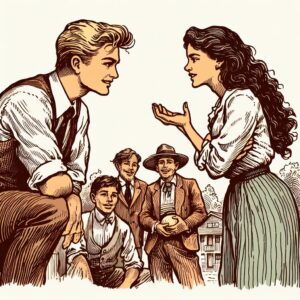I did not expect to be reviewing Anyone But You. It is a generic rom-com featuring a young lady, Sydney Sweeney, who I know only from my children, telling me about Euphoria. The trailers do not suggest much chemistry. This one feels like it’ll come and go pretty quickly.
Until I realized that the plot is about a man and woman who look like they hate each other, but only because they really like each other and are both afraid to admit it. Does this have Much Ado About Nothing vibes? Maybe I can pull some content from it.
Until I realize that it is a deliberate modern adaptation! Very cool. It’s been a long time since we had something like this. A friend mentioned She’s The Man the other day, which got us talking about 10 Things I Hate About You. But those were twenty years ago. Time for something new? The IMDB page calls it a “loose adaptation.” The commercials don’t seem to mention it at all. Let’s see!
The characters are literally named directly from the play. Sydney Sweeney’s Bea is paired up with Glen Powell’s Ben. Later, we’ll meet her father, Leo, Ben’s best friend, Claudia (now cast female), and her partner, Halle (I guess they couldn’t do much with Hero). Meddler Pete (perhaps an appropriately-cast Pedro character would have been a little over the top?) will hang out around the edges of the story, and Jonathan will be about as close to a villain as we’re going to get. So far, so good. They didn’t have to do that. That’s the kind of thing I do when I play with this idea — start with the original names and then shorten them backward until you get a modern, acceptable equivalent. Maybe that’s what the writer did here?
The premise tracks pretty closely as well. We get the backstory that the original doesn’t give us – we see Bea and Ben have a lovely meet-cute that ends badly due to a misunderstanding, setting up the whole “I really liked him/her, and I’m not over how hurt I am, that it didn’t work out” dynamic. Sometime later, they are reunited when Ben’s friend Claudia announces her wedding to Halle, Bea’s sister. Even better, it’s a destination wedding in Australia.
Let the fireworks begin! They do what they can here with the banter back and forth – the writer is no Shakespeare. Every time B&B is together, they take cheap shots at each other in a wholly unrealistic way. If two friends-of-friends in real life acted like that, their friends would make it a point to keep them apart or at least tell them to shut up. But in our movie reality, they all get together and say, “Well, it’s clear that they both want to jump each other, so let’s set that up.”
It eventually goes off to be its own thing – Ben actually likes the Margaret character, and Jonathan is Bea’s ex-boyfriend. Bea and Ben quickly see through the “get them together” plan and decide to fake it to get everyone off their backs. So it’s got some amount of original content, which I can’t fault it for.
People who keep telling me that The Lion King is Hamlet need to watch a movie like this to see how you do an adaptation. On the one hand, this thing isn’t trying to be Shakespeare. The comedy is tired and obvious, going for the easy physical laugh whenever it’s available rather than trying to do it with dialogue. On the other, it literally sprinkles Shakespeare quotes – actually attributed to Shakespeare – throughout the movie. People walk by billboards with Shakespeare quotes. Again, didn’t have to do that.
So yes, we have an R-rated modern romantic comedy that’s banking mostly on “Sydney Sweeney in a bathing suit” popularity, but once you’re in your seat, it’s not afraid to say, “Ha! This is actually Shakespeare, psych!” I’m pleasantly impressed. Regular reviews talk about the chemistry (or lack of) between the stars and the lovely scenery of Australia. But I’m just looking for the Shakespeare references. I wish they leaned into it more heavily in the marketing, and more people might give it a chance. I wouldn’t have given it a second thought without the Shakespeare connection. And here we are.





